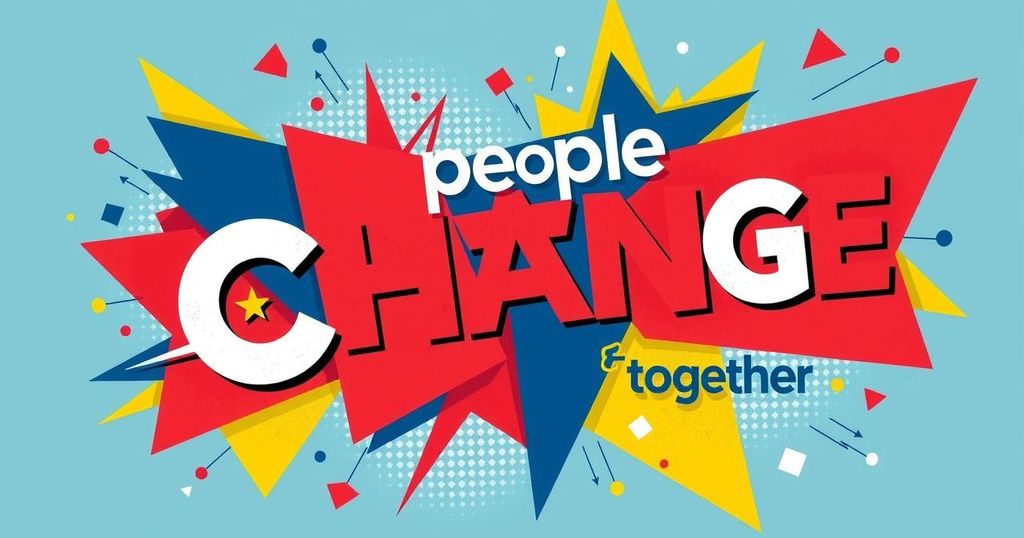The Secret of the Perfect Political Slogan
- Chris Bruni-Lowe claims to have found the formula for successful political slogans.
- His analysis of 20,000 campaign messages reveals candidates should use eight key words.
- The most potent word in successful slogans is “people,” according to his research.
- Bruni-Lowe emphasizes that slogans must be carefully structured for effectiveness.
- AI and neuroscience may transform traditional methods of political messaging.
Bruni-Lowe’s Essential Words for Political Slogans
Political strategist Chris Bruni-Lowe believes he has identified a winning formula for political slogans. He has painstakingly analyzed an impressive 20,000 campaign messages from diverse political landscapes to discover a compelling mix of eight words that resonate with voters. These words—people, better, democracy, new, time, strong, change, and together—are highlighted in his new book, “Eight Words That Changed The World.” Bruni-Lowe emphasizes that while this formula may guide slogan-writing, it is not a surefire guarantee for electoral success. A candidate lacking charisma or promoting unpopular policies may struggle, no matter how catchy the slogan.
The Power of Resonance in Slogans
Importantly, these eight words should not be haphazardly thrown together in any order. For instance, a phrase like “Strong New Time” would not convey the same meaning or impact, according to Bruni-Lowe. Instead, he refers to these words as “emotional shortcuts.” He argues that they help both the campaign and voters connect on an emotional level, without the need for complex policy discussions. For Bruni-Lowe, the most frequently employed word in successful campaigns is “people,” citing examples like Bill Clinton’s “Putting People First.” This slogan deftly allowed Clinton to establish his persona as a “people person,” contrasting sharply with the more aloof George H.W. Bush.
The Evolution of Political Messaging
Despite such insights, critics wonder if reliance on these concepts leads to uninspired, generic slogans. Some examples, like Boris Johnson’s memorable “Get Brexit Done,” show that targeted phrases can be very effective. However, Bruni-Lowe believes that slogans tailored to single issues, dubbed “bespoke slogans,” are exceptions to his general principles. He argues that while these phrases thrive during specific electoral climates, they are virtually useless once circumstances change. Furthermore, notable political phrases don’t always adhere to the formula Bruni-Lowe proposes. Take Donald Trump’s “Make America Great Again” (MAGA), for instance. This slogan, he points out, has roots stretching back over a century, marking it as a repeated political rallying cry rather than an innovation. Trump’s branding, including trademarking the phrase, transformed it into a fundamental aspect of contemporary American politics.
AI and Neuroscience: The Future of Slogan Creation
Interestingly, Bruni-Lowe also addresses the shifting landscape of political communication influenced by artificial intelligence. AI is increasingly employed to craft individualized messages targeted at specific voter concerns, distributed via social media. This approach raises questions not only about the future of political slogans but also about the genuine connection between elected officials and their constituents. Moreover, scientific advancements, particularly in neuroscience, indicate a new frontier for understanding voter reactions to political messages. Bruni-Lowe mentions the use of tools like functional magnetic resonance imaging—which tracks brain activity through blood flow—to gauge responses to advertisements and speeches. Such developments could dramatically alter the traditional methods of connecting with voters, perhaps eliminating the catchy slogans we have come to expect from political campaigns.
In summary, Chris Bruni-Lowe offers an intriguing perspective on the art of crafting political slogans, proposing that certain words can effectively resonate with voters. While traditional slogans are essential for campaigns, the future may shift toward more personalized messages driven by data and neuroscience. As technology advances, the classic catchy slogans might become relics of the past, but understanding their power and impact remains significant in today’s ever-changing political sphere.




Post Comment